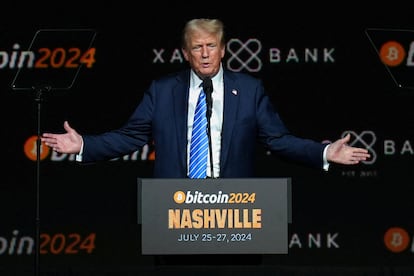Why Trump is courting the crypto bros
If Harris wants to secure the presidency, she must prevent Trump from capturing this demographic

If only those who invest in cryptocurrencies voted in the United States, Donald Trump would win the election by a wide margin.
The crypto world is predominantly male. So much so that men are estimated to be twice as likely to participate in cryptocurrency investments compared to women. This gender gap significantly influences electoral behavior in the United States, giving Trump an advantage of over 10 percentage points among crypto investors, often referred to as crypto bros.
Trump has made significant efforts to engage this audience, even though a recent Federal Reserve study shows that only 7% of Americans own cryptocurrencies. He aims to reduce the Democratic Party’s advantage among three key demographics that helped Joe Biden secure the White House four years ago: voters under 30, African-American voters, and Latinos. In a tight election, every vote counts.
In the last two elections (2020 and 2022), youth voter turnout reached record levels, largely due to increased mobilization among women, which particularly benefited the Democrats. The Republican campaign has taken notice, leveraging the higher-than-average cryptocurrency usage among men under 30 to mobilize this electorate. The party is also targeting African-American and Latino voters, who traditionally lean Democratic, but show higher rates of cryptocurrency investment in that age group. While Trump only has 8% support among African Americans, 21% of men under 50 indicate they will vote for him. This initiative to win over crypto bros parallels his similar efforts to court “gym bros.” The goal is the same: to mobilize young men.
This strategy extends beyond Trump’s campaign and the United States. Right-wing leaders in several countries have successfully targeted crypto investors. Nayib Bukele made El Salvador the first country to officially recognize cryptocurrencies as legal tender, and Javier Milei has promoted cryptocurrency investments both as a candidate and now as the president of Argentina. These developments likely influenced Trump, who back in 2021 called cryptocurrencies a “scam” and “disaster waiting to happen.” Now it is an important part of his strategy to return to the White House.
Proposals and social networks
In September, Trump launched his own cryptocurrency venture, World Liberty Financial. The website prominently features a photo of the candidate with an injured ear that was taken after the July assassination attempt.
The Trump campaign has also secured support from influential figures in the crypto world, including Ryan Selkis, who boasts over 350,000 followers on X (formerly Twitter) and plays a key role in Fair Shake, a Political Action Committee that donates primarily to conservative candidates; Jesse Powell, with over 200,000 followers; and the Winklevoss twins, Tyler and Cameron, who collectively have over 1.7 million followers.
Through these channels, the campaign pushes messages centered on masculinity. Research indicates that crypto bros often adhere to traditional gender stereotypes and fear they are failing to meet societal expectations of masculinity. This mindset can lead them to adopt far-right ideologies, including the belief that gender equality or support for minority groups harms their interests.
The Democratic reaction
The Kamala Harris campaign is aware of Trump’s strategy to attract young men and recognizes the significant increase in financial donations from the crypto world during this election cycle. In response, her campaign is making a concerted effort to dissuade or win over Republican voters, putting special focus on crypto bros.
Harris has proposed supporting the growth of the cryptocurrency market while providing a regulatory framework to protect the investment of vulnerable groups, such as African-American men. Her goal is to change the perception that the Democratic Party is less favorable to the interests of crypto investors.
What’s more, her campaign has also been supported by influencers like Mark Cuban, who has invested in various cryptocurrency projects and provides both financial and media backing to the vice president.
On November 5, it won’t just be crypto bros voting; but the votes of this 7% could prove decisive. If Harris wants to secure the presidency, she must prevent Trump from capturing this demographic. It remains to be seen which strategy will yield better results.
Sign up for our weekly newsletter to get more English-language news coverage from EL PAÍS USA Edition
Tu suscripción se está usando en otro dispositivo
¿Quieres añadir otro usuario a tu suscripción?
Si continúas leyendo en este dispositivo, no se podrá leer en el otro.
FlechaTu suscripción se está usando en otro dispositivo y solo puedes acceder a EL PAÍS desde un dispositivo a la vez.
Si quieres compartir tu cuenta, cambia tu suscripción a la modalidad Premium, así podrás añadir otro usuario. Cada uno accederá con su propia cuenta de email, lo que os permitirá personalizar vuestra experiencia en EL PAÍS.
¿Tienes una suscripción de empresa? Accede aquí para contratar más cuentas.
En el caso de no saber quién está usando tu cuenta, te recomendamos cambiar tu contraseña aquí.
Si decides continuar compartiendo tu cuenta, este mensaje se mostrará en tu dispositivo y en el de la otra persona que está usando tu cuenta de forma indefinida, afectando a tu experiencia de lectura. Puedes consultar aquí los términos y condiciones de la suscripción digital.









































